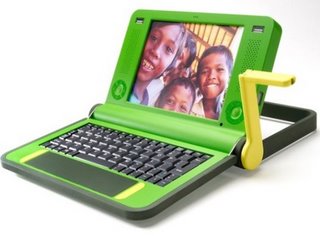One Laptop per Child
Imagine a rural classroom in a deveoping country. Now imagine each student there carrying a small laptop computer to class. And further, imagine the class using an innovative constructionist teaching approach where this new technology is used both as an electronic book and as a portal for interactive learning. Could such a scenario ever be translated into reality? Well, one group of enthusiastic educators and technology gurus in the United States is not only convinced that this can be done, but is already developing a $100 laptop aimed at providing one such machine to each child in the developing world.
The $100 laptop is being developed by One Laptop per Child (OLPC), a non-profit organization created by Nicholas Negroponte, former director of the world-famous Media Lab at the Massachusetts Institute of Technology, and some of his colleagues. The idea behind this project is to provide "every child in the world access to knowledge and modern forms of education" in order to equip them with the human capital needed to overcome poverty. As a matter of fact, the project was announced at the World Economic Forum in Davos, Switzerland in January 2005. And UNDP has recently signed a partnership agreement with OLPC to assist in the delivery of the technology and learning resources to schools in poor countries.
So does this wild vision have any relevance for Nepal? While addressing this question, let us also briefly review some technological, pedagocial, and financial aspects of the OLPC concept. From a technologcial perspective, we need to ask whether the proposed laptop will be a fully functional computer, or whether it will just be a glorified toy. Negroponte explains that with a 500 MHz processer, 128 MB memory, 500 megabyte of Flash memory (no hard disk), and streamlined software, there is nothing these laptops cannot do that a $1000 version can do (except for storing large amounts of data). Other notable strengths of this rugged machine are that it is equipped with wireless networking technology that allows each laptop to talk to its neighbors creating a local area network, uses innovative power (including wind-up) for functioning in times of electricity unavailability, uses the free open source Linux operating system, and operates in the local language.
From a pedagogical perspective, the local networking and local language capability of these computers would be most useful for encouraging interactive and discussion-oriented learning. Plus these machines would also provide immediate access to soft copies of many years of textbooks and a load of reference books, thereby addressing book delivery problems plaguing developing countries like Nepal. How effectively these tools can be used will, of course, depend on the extent to which schools and teachers are able to take a constructionist approach to teaching.
 Nepal missed out on the IT revolution of the earlier decades due to ignorance and outright negligence on the part of our past rulers. But we might now have a second chance to make a judicious long-term and timely investment in human capital and IT development, an investment that could potentially help us to overcome the contraints posed by our geography and leap forward on the path of economic progress. A natural first reaction among many readers might be that OLPC's vision of poor children carrying their own laptops to school is simply irrelevant in a country where many children can not even afford schoolbags and notebooks, and where there is a pressing need to address more immediate problems such as the perennial shortage of classrooms and teachers. But the question is not whether this particular vision is of practical relevance to Nepal. Rather, the question is whether Nepal can develop a long-term vision for itself and devise a strategy to best take advantage of the opportunities afforded by the OLPC campaign while not losing sight of other pressing needs.
Nepal missed out on the IT revolution of the earlier decades due to ignorance and outright negligence on the part of our past rulers. But we might now have a second chance to make a judicious long-term and timely investment in human capital and IT development, an investment that could potentially help us to overcome the contraints posed by our geography and leap forward on the path of economic progress. A natural first reaction among many readers might be that OLPC's vision of poor children carrying their own laptops to school is simply irrelevant in a country where many children can not even afford schoolbags and notebooks, and where there is a pressing need to address more immediate problems such as the perennial shortage of classrooms and teachers. But the question is not whether this particular vision is of practical relevance to Nepal. Rather, the question is whether Nepal can develop a long-term vision for itself and devise a strategy to best take advantage of the opportunities afforded by the OLPC campaign while not losing sight of other pressing needs.
The government should, therefore, promptly and serioulsly start exploring how they can make this technolgy feasible in the Nepali context: what grades to focus initially; how students, teachers and families can be prepared to adopt this technology; what alternative uses can be made of this technology (eg, using students' laptops to create VoIP phone network for their village); and how the many daunting delivery and maintenance challenges can be overcome. Opportunity knocks, but not repeatedly. To quote one IT enthusiast, the OLPC project provides "the perfect setting for a flowering of ingenuity that will put the Industrial Revolution to shame." If he is even half right, then summarily dismissing or completely ignoring the $100 laptop could be a fatal mistake for the nation.
By Dr Saurav Dev Bhatta (Thewriter is a faculty member at the Univeristy of Illinois, Chicago)
Source: www.ekantipur.com

No comments:
Post a Comment